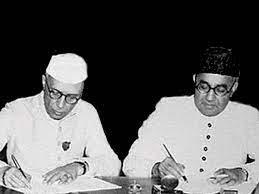Nehru-Liaquat Pact:

Death anniversary of Syama Prasad Mookerjee was marked recently. He resigned from the cabinet of JL Nehru in April 1950 over the controversial Nehru-Liaquat Pact.
- The Liaquat-Nehru Pact was a post-Partition agreement between India and Pakistan in 1950.
- The pact aimed to address the treatment of minorities in both countries and provide them with equal rights and security.
- However, the pact became a point of contention for Syama Prasad Mookerjee, a member of the Hindu Mahasabha and a part of Nehru’s first Union Cabinet.
- June 23rd is the 70th death anniversary of Syama Prasad Mookerjee
- Nehru-Liaquat Pact (also called Delhi Pact) was signed on April 8, 1950, between Jawaharlal Nehru (Prime Minister of India) and Liaquat Ali Khan (Prime Minister of Pakistan)
- Purpose was to establish a framework for the treatment of minorities in India and Pakistan due to Communal tensions and violence during the Partition of India in 1947
- Provisions of the Pact:
- Refugees were allowed to return safe and unmolested to dispose of their property.
- Abducted women and looted property were to be returned.
- Forced conversions were derecognized.
- Minority rights were confirmed.
- Setting up minority commissions in both India and Pakistan
- Countries to ensure complete equality of citizenship for minorities in both countries
- Countries will guarantee freedom of movement within each country, freedom of occupation, speech, and worship for minorities




